揭秘 3000 個生活實用英文單字,幫助你輕鬆掌握高效溝通
想要快速掌握日常英文對話,卻不知道從哪些單字開始學起嗎?根據語言學習專家分析,掌握2000個高頻生活實用英文單字,就能涵蓋日常對話中80%的溝通內容,讓你從零基礎快速進階到流利表達。這些核心詞彙包含食衣住行育樂等六大生活領域,是每個英文學習者都應該優先掌握的基礎建設。
然而,許多學習者卻陷入了「背了就忘、用時想不起來」的困境,問題往往出在缺乏系統化的學習方法和實際應用練習。研究顯示,單純的死記硬背只能讓詞彙停留在「被動認知」階段,無法轉化為「主動運用」的溝通技能。真正有效的學習策略是將詞彙融入真實生活情境,透過模擬對話和實戰演練來強化記憶。
本篇指南由PREP教育團隊精心規劃,運用科學化的「80/20學習法則」,系統性地整理出最實用的詞彙分類表格,搭配五大生活場景的對話實戰演練,讓你不只是背單字,更能真正「說得出、用得上」,實現從零基礎到流利溝通的完美蛻變。
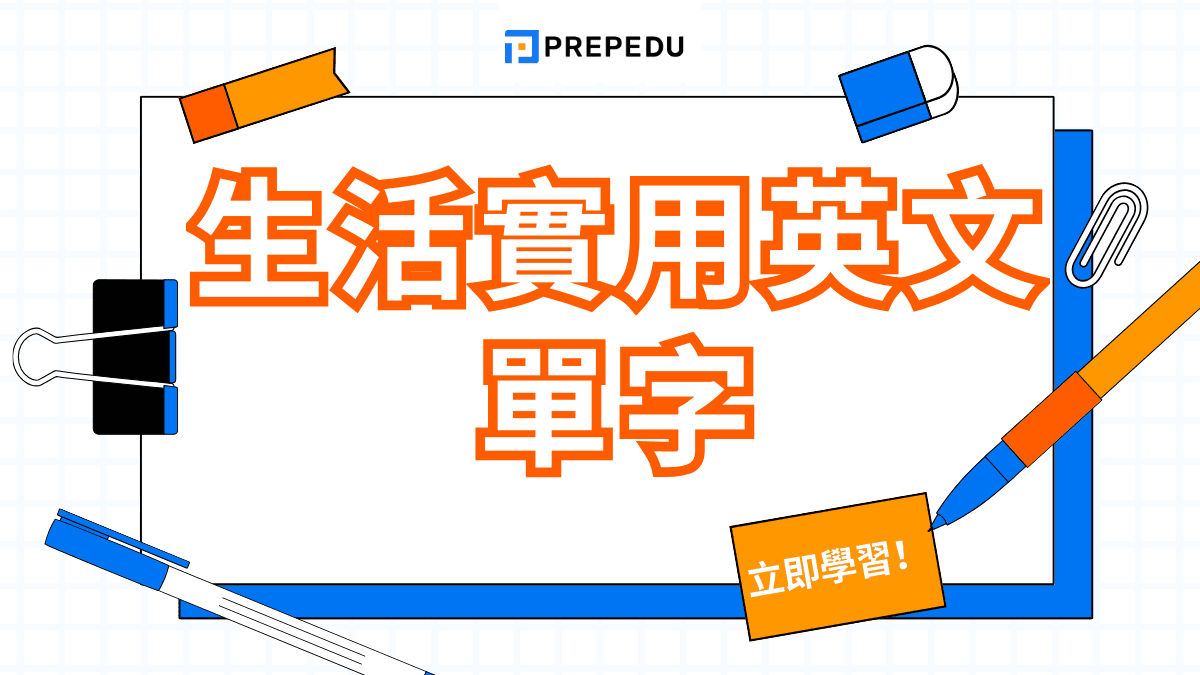
I. 最常用的生活實用英文單字大全
學習英文單字最有效的方法,就是遵循「80/20法則」的原理。研究顯示,在日常英文對話中,我們使用頻率最高的2000個單字,就能涵蓋約80%的日常溝通內容。因此,與其盲目地背誦字典,不如專注於掌握這些高頻率的生活實用英文單字,這樣不僅學習效率更高,也能更快看到實際的學習成果。
以下我們將這些核心詞彙分為三大類別:動詞、名詞和形容詞。每個類別都經過精心篩選,確保收錄的都是你在日常生活中最常遇到、最需要使用的詞彙。透過系統化的分類學習,你能夠更有條理地建立自己的英文詞彙庫。
1. 日常活動相關動詞
英語動詞是句子的靈魂,掌握了這些高頻動詞,你就能表達大部分的日常行為和活動。以下是50個最實用的日常動詞,這些詞彙涵蓋了從早晨起床到晚上就寢的各種活動。
|
生活實用英文單字 |
IPA音標 |
意思 |
例句 |
|
wake up |
/weɪk ʌp/ |
醒來 |
I usually wake up at 7 AM every morning. (我通常每天早上7點醒來。) |
|
get up |
/ɡet ʌp/ |
起床 |
She likes to get up early to exercise. (她喜歡早起運動。) |
|
brush |
/brʌʃ/ |
刷 |
Don't forget to brush your teeth before bed. (睡前別忘了刷牙。) |
|
wash |
/wɒʃ/ |
洗 |
I need to wash my hands before eating. (吃飯前我需要洗手。) |
|
shower |
/ˈʃaʊər/ |
洗澡 |
He prefers to shower in the evening. (他比較喜歡晚上洗澡。) |
|
dress |
/dres/ |
穿衣 |
It takes me 10 minutes to dress for work. (我穿工作服需要10分鐘。) |
|
eat |
/iːt/ |
吃 |
What time do you usually eat breakfast? (你通常幾點吃早餐?) |
|
drink |
/drɪŋk/ |
喝 |
I drink at least 8 glasses of water daily. (我每天至少喝8杯水。) |
|
cook |
/kʊk/ |
煮、烹飪 |
My mom taught me how to cook pasta. (我媽媽教我如何煮義大利麵。) |
|
work |
/wɜːrk/ |
工作 |
I work from 9 to 5 every weekday. (我每個工作日從9點工作到5點。) |
|
study |
/ˈstʌdi/ |
學習、讀書 |
She needs to study for her English exam. (她需要為英文考試讀書。) |
|
drive |
/draɪv/ |
開車 |
Can you drive me to the airport? (你可以開車載我去機場嗎?) |
|
walk |
/wɔːk/ |
走路 |
I like to walk in the park after dinner. (我喜歡晚飯後在公園散步。) |
|
run |
/rʌn/ |
跑步 |
He likes to run 5 kilometers every morning. (他喜歡每天早上跑5公里。) |
|
exercise |
/ˈeksərsaɪz/ |
運動 |
I exercise at the gym three times a week. (我每週在健身房運動三次。) |
|
shop |
/ʃɒp/ |
購物 |
We need to shop for groceries this weekend. (這個週末我們需要買日用品。) |
|
buy |
/baɪ/ |
買 |
I want to buy a new phone next month. (我下個月想買一支新手機。) |
|
sell |
/sel/ |
賣 |
They sell fresh vegetables at the market. (他們在市場賣新鮮蔬菜。) |
|
pay |
/peɪ/ |
付費 |
How would you like to pay for this? (您想要如何付款?) |
|
save |
/seɪv/ |
節省、存錢 |
I'm trying to save money for vacation. (我正在為度假存錢。) |
|
clean |
/kliːn/ |
清潔 |
I clean my room every Saturday. (我每個星期六打掃房間。) |
|
organize |
/ˈɔːrɡənaɪz/ |
整理 |
She likes to organize her desk before working. (她喜歡工作前整理桌子。) |
|
relax |
/rɪˈlæks/ |
放鬆 |
I relax by listening to music. (我透過聽音樂來放鬆。) |
|
sleep |
/sliːp/ |
睡覺 |
I usually sleep 8 hours every night. (我通常每晚睡8小時。) |
|
watch |
/wɒtʃ/ |
看 |
We watch a movie every Friday night. (我們每個星期五晚上看電影。) |
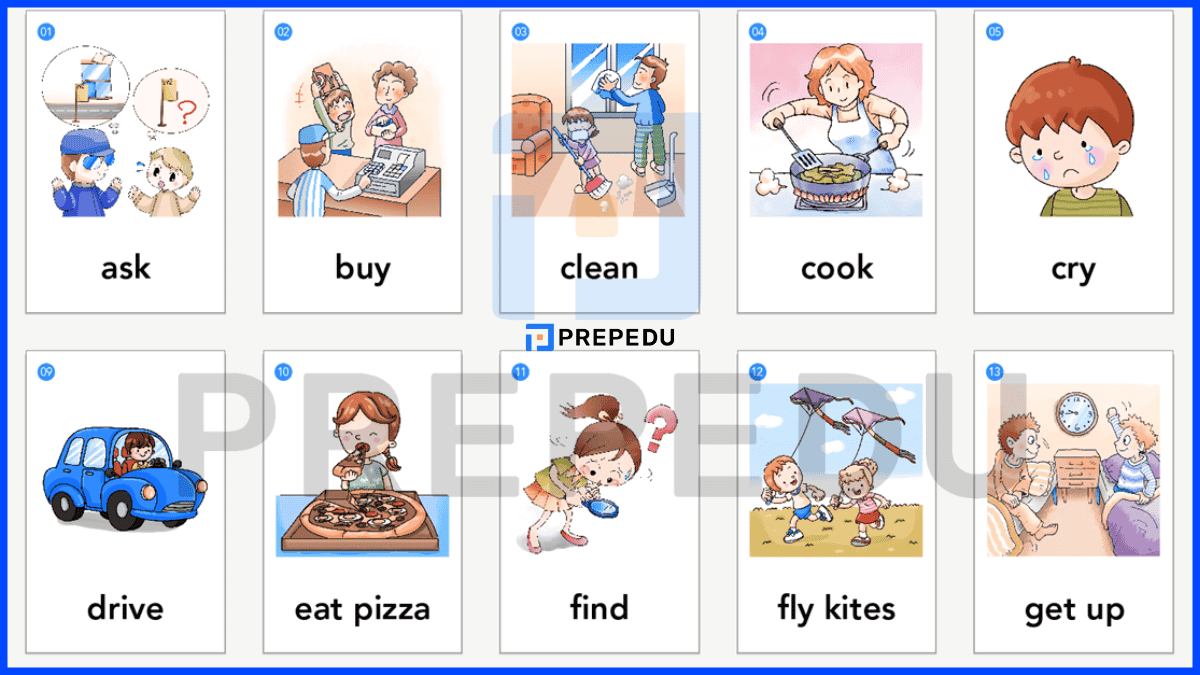
參考更多相關文章:
2. 與生活主題相關的名詞
英文名詞是構成對話的基礎元素,掌握了這些與日常生活密切相關的名詞,你就能準確描述周遭的事物。以下按照不同的生活主題分類,讓你能夠有系統地學習和記憶。
2.1. 食物
食物是我們每天都會接觸到的話題,無論是在餐廳點餐、在超市購物,還是與朋友討論喜好,這些詞彙都是必不可少的。
|
生活實用英文單字 |
IPA音標 |
意思 |
例句 |
|
bread |
/bred/ |
麵包 |
I bought fresh bread from the bakery. (我從麵包店買了新鮮麵包。) |
|
rice |
/raɪs/ |
米飯 |
Rice is a staple food in many Asian countries. (米飯是許多亞洲國家的主食。) |
|
chicken |
/ˈtʃɪkɪn/ |
雞肉 |
The chicken soup tastes delicious. (雞湯嚐起來很美味。) |
|
beef |
/biːf/ |
牛肉 |
I ordered beef steak for dinner. (我點了牛排當晚餐。) |
|
pork |
/pɔːrk/ |
豬肉 |
Pork is not allowed in some religions. (某些宗教不允許吃豬肉。) |
|
fish |
/fɪʃ/ |
魚 |
Fresh fish is available at the market. (市場有新鮮魚類。) |
|
vegetables |
/ˈvedʒtəbəlz/ |
蔬菜 |
Eating vegetables is good for your health. (吃蔬菜對健康有益。) |
|
carrot |
/ˈkærət/ |
紅蘿蔔 |
Carrots are rich in vitamin A. (紅蘿蔔富含維生素A。) |
|
tomato |
/təˈmeɪtoʊ/ |
番茄 |
I add tomatoes to my salad. (我在沙拉裡加番茄。) |
|
potato |
/pəˈteɪtoʊ/ |
馬鈴薯 |
Baked potatoes are my favorite side dish. (烤馬鈴薯是我最喜歡的配菜。) |
|
onion |
/ˈʌnjən/ |
洋蔥 |
Onions make me cry when I cut them. (切洋蔥會讓我流淚。) |
|
lettuce |
/ˈletɪs/ |
萵苣 |
The lettuce in this salad is very fresh. (這個沙拉的萵苣很新鮮。) |
|
apple |
/ˈæpəl/ |
蘋果 |
An apple a day keeps the doctor away. (一天一蘋果,醫生遠離我。) |
|
banana |
/bəˈnænə/ |
香蕉 |
Bananas are high in potassium. (香蕉含有豐富的鉀。) |
|
orange |
/ˈɔːrɪndʒ/ |
橘子 |
I drink fresh orange juice every morning. (我每天早上喝新鮮橘子汁。) |
|
cheese |
/tʃiːz/ |
起司 |
This cheese pairs well with wine. (這個起司很適合配紅酒。) |
|
milk |
/mɪlk/ |
牛奶 |
I add milk to my coffee. (我在咖啡裡加牛奶。) |
|
egg |
/eɡ/ |
雞蛋 |
I eat two eggs for breakfast. (我早餐吃兩顆雞蛋。) |
|
pasta |
/ˈpɑːstə/ |
義大利麵 |
Pasta is easy to cook for dinner. (義大利麵很容易當晚餐來煮。) |
|
soup |
/suːp/ |
湯 |
Hot soup is perfect for cold weather. (熱湯很適合寒冷的天氣。) |
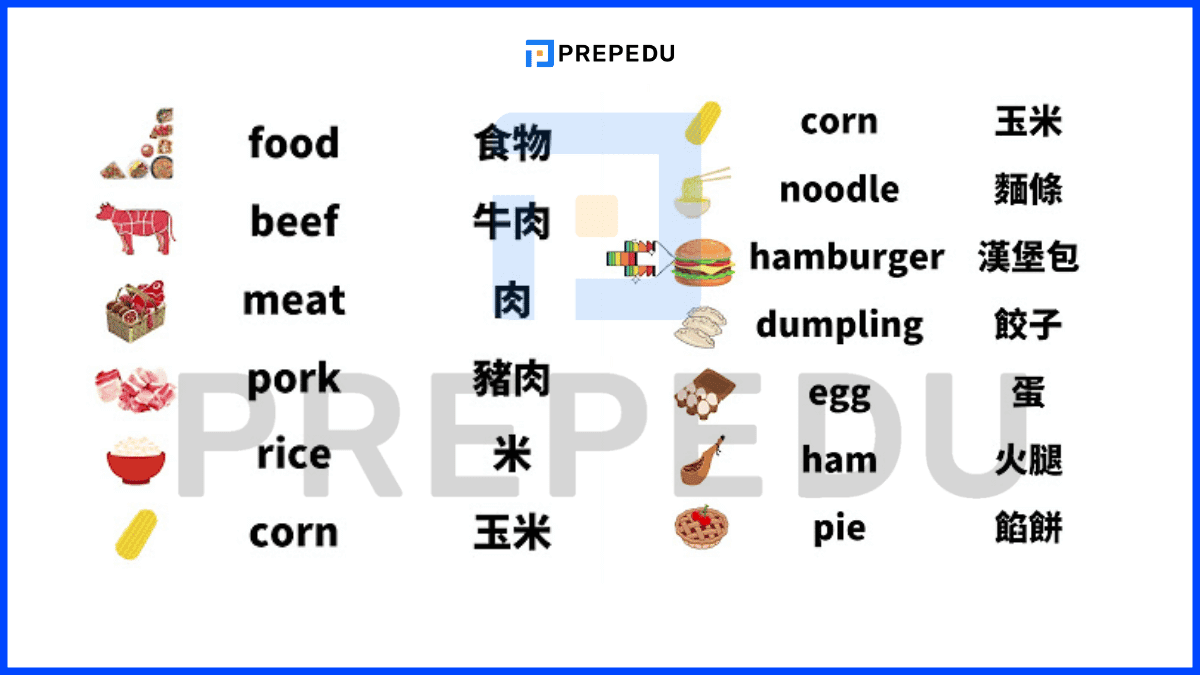
2.2. 飲料
飲料英文單字在日常生活中扮演重要角色,從早晨的咖啡到晚上的茶,這些詞彙幫助你在各種場合都能準確表達自己的需求。
|
生活實用英文單字 |
IPA音標 |
意思 |
例句 |
|
water |
/ˈwɔːtər/ |
水 |
Drinking enough water is essential for health. (喝足夠的水對健康很重要。) |
|
coffee |
/ˈkɔːfi/ |
咖啡 |
I need a cup of coffee to start my day. (我需要一杯咖啡來開始我的一天。) |
|
tea |
/tiː/ |
茶 |
Green tea has many health benefits. (綠茶有很多健康益處。) |
|
juice |
/dʒuːs/ |
果汁 |
Fresh orange juice is rich in vitamin C. (新鮮橘子汁富含維生素C。) |
|
soda |
/ˈsoʊdə/ |
汽水 |
I try to avoid drinking soda because of sugar. (我盡量避免喝汽水因為糖分太多。) |
|
beer |
/bɪr/ |
啤酒 |
He ordered a cold beer with dinner. (他點了一杯冰啤酒配晚餐。) |
|
wine |
/waɪn/ |
紅酒 |
Red wine goes well with steak. (紅酒很適合配牛排。) |
|
smoothie |
/ˈsmuːði/ |
果昔 |
I made a banana smoothie for breakfast. (我做了香蕉果昔當早餐。) |
|
milkshake |
/ˈmɪlkʃeɪk/ |
奶昔 |
The chocolate milkshake was delicious. (巧克力奶昔很好喝。) |
|
lemonade |
/ˌleməˈneɪd/ |
檸檬水 |
Fresh lemonade is perfect for summer. (新鮮檸檬水很適合夏天。) |
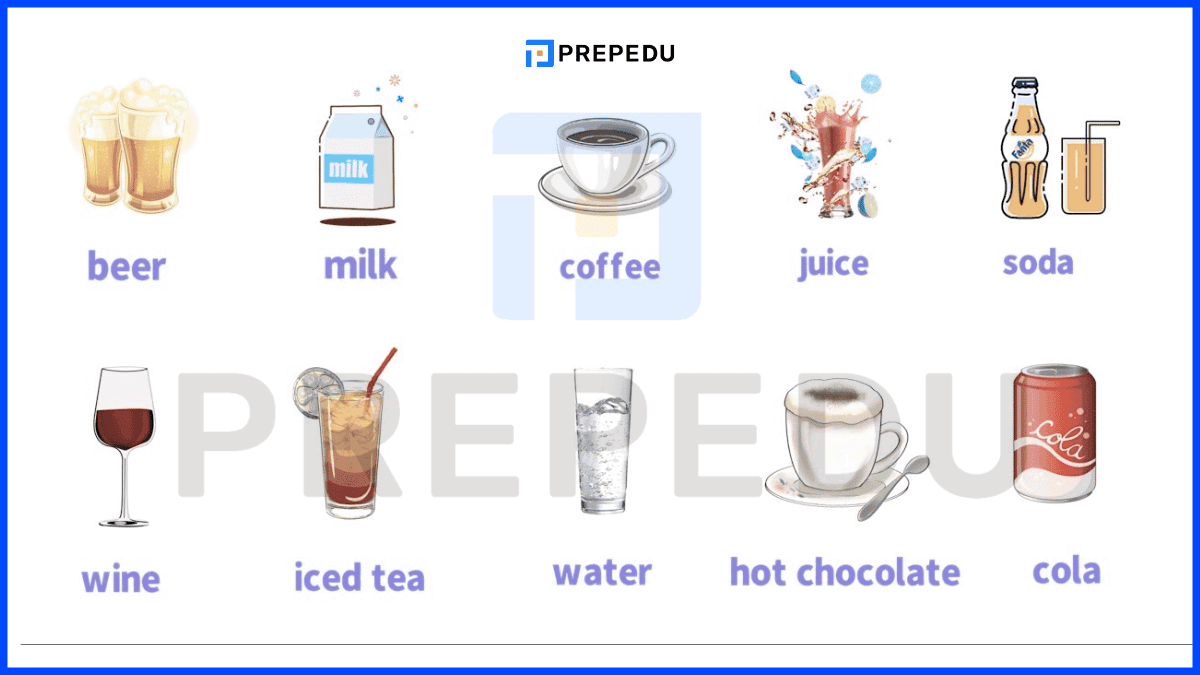
2.3. 家中常用物品
家是我們生活的中心,了解家中各家具英文單子,能讓你在日常對話中更準確地描述生活環境和需求。
|
生活實用英文單字 |
IPA音標 |
意思 |
例句 |
|
bed |
/bed/ |
床 |
I need to make my bed every morning. (我每天早上需要整理床鋪。) |
|
chair |
/tʃer/ |
椅子 |
This chair is very comfortable. (這張椅子很舒服。) |
|
table |
/ˈteɪbəl/ |
桌子 |
Please put the book on the table. (請把書放在桌子上。) |
|
sofa |
/ˈsoʊfə/ |
沙發 |
We watch TV on the sofa every evening. (我們每天晚上在沙發上看電視。) |
|
television |
/ˈtelɪvɪʒən/ |
電視 |
The television in the living room is very large. (客廳的電視很大。) |
|
refrigerator |
/rɪˈfrɪdʒəreɪtər/ |
冰箱 |
I keep vegetables in the refrigerator. (我把蔬菜放在冰箱裡。) |
|
stove |
/stoʊv/ |
爐子 |
I cook pasta on the gas stove. (我在瓦斯爐上煮義大利麵。) |
|
microwave |
/ˈmaɪkrəweɪv/ |
微波爐 |
I heat my lunch in the microwave. (我用微波爐加熱午餐。) |
|
shower |
/ˈʃaʊər/ |
淋浴間 |
The shower water is too hot. (淋浴的水太熱了。) |
|
toilet |
/ˈtɔɪlət/ |
馬桶 |
Don't forget to clean the toilet. (別忘了清潔馬桶。) |
|
mirror |
/ˈmɪrər/ |
鏡子 |
I check my appearance in the mirror. (我在鏡子前檢查我的外表。) |
|
towel |
/ˈtaʊəl/ |
毛巾 |
I use a clean towel after shower. (洗澡後我用乾淨毛巾。) |
|
pillow |
/ˈpɪloʊ/ |
枕頭 |
I need two pillows to sleep comfortably. (我需要兩個枕頭才能睡得舒服。) |
|
blanket |
/ˈblæŋkət/ |
毯子 |
This blanket keeps me warm at night. (這條毯子讓我晚上保持溫暖。) |
|
lamp |
/læmp/ |
檯燈 |
I read books under the lamp. (我在檯燈下看書。) |
|
window |
/ˈwɪndoʊ/ |
窗戶 |
Please open the window for fresh air. (請打開窗戶讓新鮮空氣進來。) |
|
door |
/dɔːr/ |
門 |
Don't forget to lock the door. (別忘了鎖門。) |
|
key |
/kiː/ |
鑰匙 |
I lost my house key yesterday. (我昨天弄丟了房子鑰匙。) |
|
phone |
/foʊn/ |
電話 |
My phone battery is almost dead. (我的手機電池快沒電了。) |
|
computer |
/kəmˈpjuːtər/ |
電腦 |
I use my computer for work. (我用電腦工作。) |
2.4. 緊急用品
在緊急情況下,能夠準確表達醫療相關需求是非常重要的。這些詞彙能幫助你在需要時獲得適當的幫助。
|
生活實用英文單字 |
IPA音標 |
意思 |
例句 |
|
medicine |
/ˈmedɪsən/ |
藥物 |
I need to take my medicine twice a day. (我需要一天吃兩次藥。) |
|
bandage |
/ˈbændɪdʒ/ |
繃帶 |
Put a bandage on the cut. (在傷口上貼繃帶。) |
|
hospital |
/ˈhɑːspɪtəl/ |
醫院 |
He was rushed to the hospital. (他被緊急送往醫院。) |
|
doctor |
/ˈdɑːktər/ |
醫生 |
I have an appointment with the doctor. (我跟醫生有預約。) |
|
ambulance |
/ˈæmbjələns/ |
救護車 |
Call an ambulance immediately! (立刻叫救護車!) |
|
pharmacy |
/ˈfɑːrməsi/ |
藥局 |
I need to go to the pharmacy to buy medicine. (我需要去藥局買藥。) |
|
thermometer |
/θərˈmɑːmɪtər/ |
溫度計 |
Use the thermometer to check your fever. (用溫度計檢查你的發燒。) |
|
prescription |
/prɪˈskrɪpʃən/ |
處方籤 |
I need a prescription from the doctor. (我需要醫生的處方籤。) |
|
emergency |
/ɪˈmɜːrdʒənsi/ |
緊急事件 |
Call 911 in case of emergency. (緊急情況請撥打911。) |
|
first aid |
/fɜːrst eɪd/ |
急救 |
I learned first aid in school. (我在學校學過急救。) |
2.5. 天氣
天氣英文單字是日常對話中最常見的話題之一,掌握這些詞彙能讓你輕鬆參與相關討論。
|
生活實用英文單字 |
IPA音標 |
意思 |
例句 |
|
sunny |
/ˈsʌni/ |
晴朗的 |
It's a sunny day today. (今天是晴朗的一天。) |
|
cloudy |
/ˈklaʊdi/ |
多雲的 |
The sky looks cloudy this morning. (今天早上天空看起來多雲。) |
|
rainy |
/ˈreɪni/ |
下雨的 |
I don't like rainy weather. (我不喜歡下雨天。) |
|
snowy |
/ˈsnoʊi/ |
下雪的 |
Snowy days are beautiful but cold. (雪天很美但很冷。) |
|
windy |
/ˈwɪndi/ |
有風的 |
It's quite windy outside today. (今天外面風很大。) |
|
hot |
/hɑːt/ |
炎熱的 |
Summer days can be very hot. (夏天可能會很炎熱。) |
|
cold |
/koʊld/ |
寒冷的 |
Winter nights are cold. (冬天的夜晚很寒冷。) |
|
warm |
/wɔːrm/ |
溫暖的 |
Spring weather is usually warm. (春天的天氣通常很溫暖。) |
|
cool |
/kuːl/ |
涼爽的 |
Autumn evenings are cool and pleasant. (秋天的傍晚涼爽宜人。) |
|
temperature |
/ˈtemprətʃər/ |
溫度 |
The temperature today is 25 degrees. (今天的溫度是25度。) |
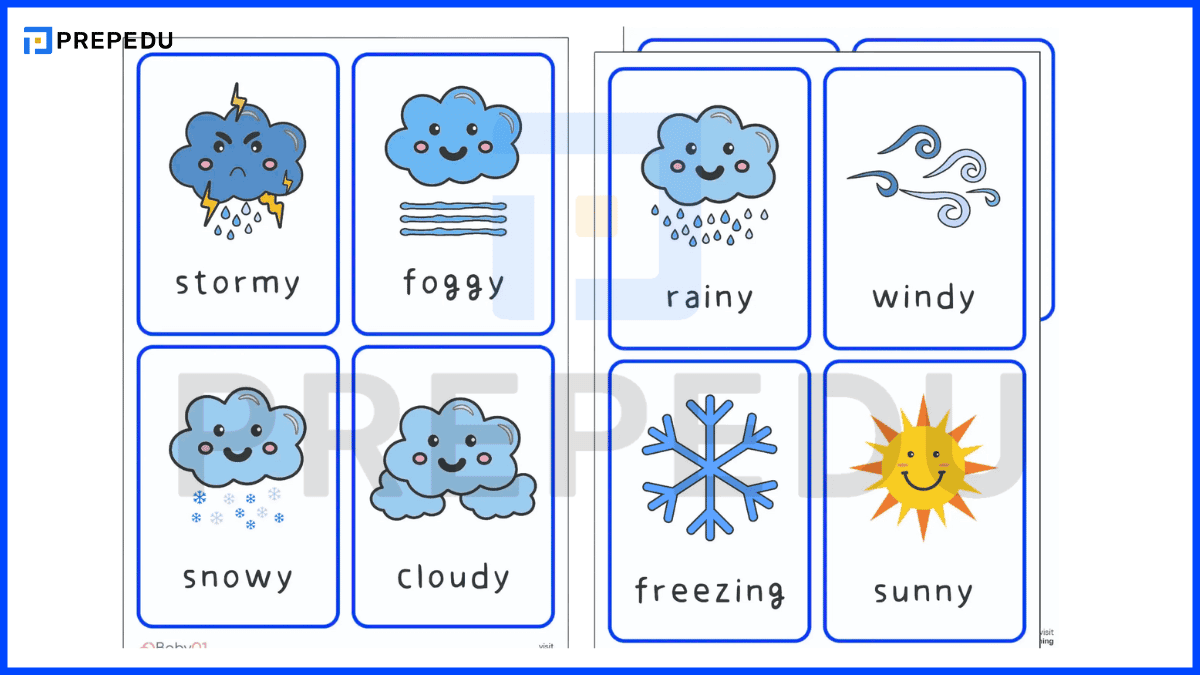
2.6. 交通
交通工具英文詞彙是現代生活不可或缺的一部分,這些詞彙能幫助你在各種交通情況下進行有效溝通。
|
生活實用英文單字 |
IPA音標 |
意思 |
例句 |
|
car |
/kɑːr/ |
汽車 |
I drive my car to work every day. (我每天開車上班。) |
|
bus |
/bʌs/ |
公車 |
The bus arrives at 8:30 AM. (公車在早上8點30分到達。) |
|
train |
/treɪn/ |
火車 |
I take the train to visit my parents. (我搭火車去看我父母。) |
|
subway |
/ˈsʌbweɪ/ |
地鐵 |
The subway is faster during rush hour. (尖峰時間地鐵比較快。) |
|
taxi |
/ˈtæksi/ |
計程車 |
I called a taxi to the airport. (我叫了計程車去機場。) |
|
bicycle |
/ˈbaɪsɪkəl/ |
腳踏車 |
I ride my bicycle to the park. (我騎腳踏車去公園。) |
|
motorcycle |
/ˈmoʊtərsaɪkəl/ |
機車 |
He rides a motorcycle to work. (他騎機車上班。) |
|
airplane |
/ˈerplen/ |
飛機 |
The airplane will take off at 3 PM. (飛機將在下午3點起飛。) |
|
airport |
/ˈerpɔːrt/ |
機場 |
I need to be at the airport two hours early. (我需要提前兩小時到機場。) |
|
station |
/ˈsteɪʃən/ |
車站 |
The train station is very busy. (火車站很繁忙。) |
|
traffic |
/ˈtræfɪk/ |
交通 |
Traffic is heavy during rush hour. (尖峰時間交通很繁忙。) |
|
ticket |
/ˈtɪkət/ |
車票 |
I bought a round-trip ticket. (我買了來回票。) |
|
road |
/roʊd/ |
道路 |
This road leads to the city center. (這條道路通往市中心。) |
|
street |
/striːt/ |
街道 |
My house is on Main Street. (我家在主街上。) |
|
bridge |
/brɪdʒ/ |
橋樑 |
We crossed the bridge to get to the other side. (我們過橋到對岸。) |
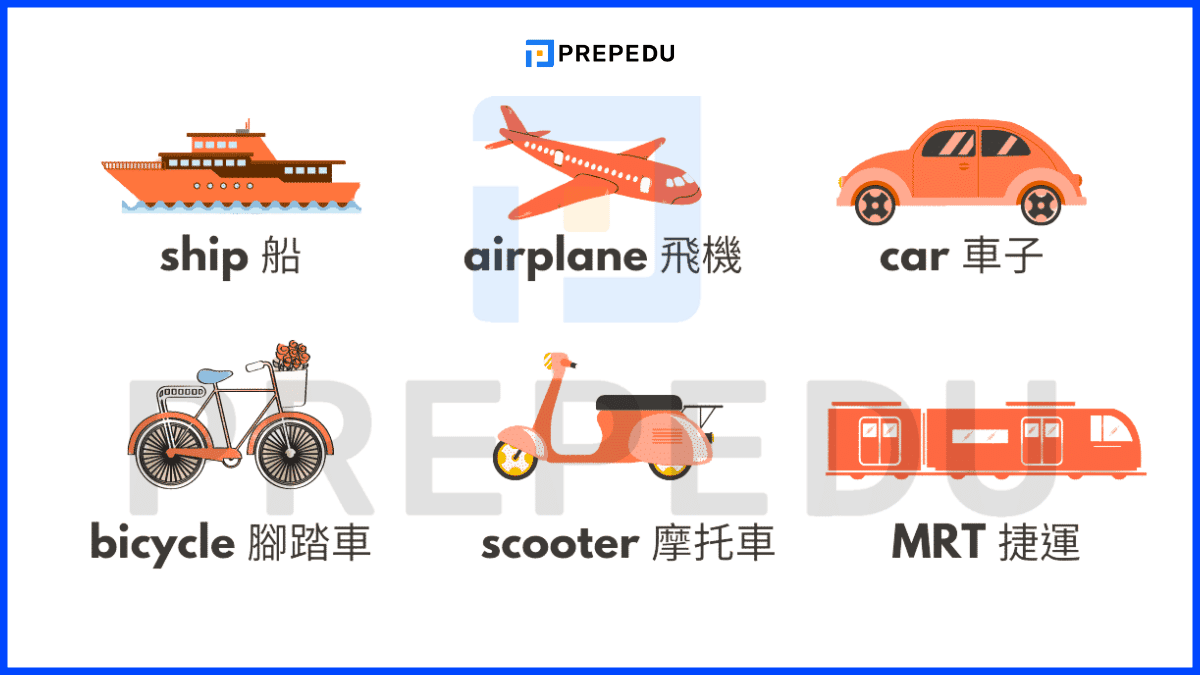
2.7. 工作
工作是成年人生活的重要組成部分,掌握職場相關詞彙能幫助你在工作環境中進行有效溝通。
|
生活實用英文單字 |
IPA音標 |
意思 |
例句 |
|
job |
/dʒɑːb/ |
工作 |
I love my job as a teacher. (我喜歡我當老師的工作。) |
|
office |
/ˈɔːfɪs/ |
辦公室 |
I work in an office downtown. (我在市區的辦公室工作。) |
|
meeting |
/ˈmiːtɪŋ/ |
會議 |
We have a meeting at 3 PM today. (我們今天下午3點有會議。) |
|
computer |
/kəmˈpjuːtər/ |
電腦 |
I use my computer for most of my work. (我大部分工作都用電腦。) |
|
|
/ˈiːmeɪl/ |
電子郵件 |
I check my email every morning. (我每天早上檢查電子郵件。) |
|
boss |
/bɔːs/ |
老闆 |
My boss is very understanding. (我的老闆很體諒人。) |
|
colleague |
/ˈkɑːliːɡ/ |
同事 |
I have lunch with my colleagues every Friday. (我每個星期五和同事一起吃午餐。) |
|
salary |
/ˈsæləri/ |
薪水 |
My salary covers all my basic needs. (我的薪水足以負擔基本需求。) |
|
project |
/ˈprɑːdʒekt/ |
專案 |
We're working on an important project. (我們正在進行一個重要專案。) |
|
deadline |
/ˈdedlaɪn/ |
截止日期 |
The deadline for this report is Monday. (這份報告的截止日期是星期一。) |
|
interview |
/ˈɪntərvjuː/ |
面試 |
I have a job interview tomorrow. (我明天有工作面試。) |
|
resume |
/rɪˈzuːmeɪ/ |
履歷 |
I need to update my resume. (我需要更新我的履歷。) |
|
schedule |
/ˈskedʒuːl/ |
行程 |
My schedule is very busy this week. (我這週的行程很忙。) |
|
break |
/breɪk/ |
休息 |
I take a 15-minute break every two hours. (我每兩小時休息15分鐘。) |
|
overtime |
/ˈoʊvərtaɪm/ |
加班 |
I worked overtime to finish the project. (我加班完成專案。) |
2.8. 服裝
衣服英文詞彙是日常生活不可或缺的部分,了解各種衣物的英文名稱能讓你在購物和日常對話中更加自如。
|
生活實用英文單字 |
IPA音標 |
意思 |
例句 |
|
shirt |
/ʃɜːrt/ |
襯衫 |
I wear a white shirt to work. (我穿白襯衫上班。) |
|
pants |
/pænts/ |
長褲 |
These pants are very comfortable. (這條褲子很舒服。) |
|
dress |
/dres/ |
洋裝 |
She wore a beautiful dress to the party. (她穿了一件漂亮洋裝去派對。) |
|
shoes |
/ʃuːz/ |
鞋子 |
I need new running shoes. (我需要新的跑鞋。) |
|
socks |
/sɑːks/ |
襪子 |
My socks don't match today. (我今天的襪子不成對。) |
|
jacket |
/ˈdʒækət/ |
外套 |
It's cold, so I'm wearing a jacket. (天氣冷,所以我穿外套。) |
|
sweater |
/ˈswetər/ |
毛衣 |
This sweater keeps me warm. (這件毛衣讓我保持溫暖。) |
|
jeans |
/dʒiːnz/ |
牛仔褲 |
I love wearing jeans on weekends. (我喜歡週末穿牛仔褲。) |
|
skirt |
/skɜːrt/ |
裙子 |
The skirt matches her blouse perfectly. (這條裙子和她的上衣很搭。) |
|
hat |
/hæt/ |
帽子 |
I wear a hat to protect from the sun. (我戴帽子防曬。) |
|
coat |
/koʊt/ |
大衣 |
My winter coat is very warm. (我的冬季大衣很保暖。) |
|
tie |
/taɪ/ |
領帶 |
He wears a tie to formal meetings. (他開正式會議時戴領帶。) |
|
belt |
/belt/ |
皮帶 |
This belt goes well with my pants. (這條皮帶很配我的褲子。) |
|
underwear |
/ˈʌndərwer/ |
內衣 |
I buy comfortable underwear. (我買舒適的內衣。) |
|
pajamas |
/pəˈdʒɑːməz/ |
睡衣 |
I put on my pajamas before bed. (睡前我穿上睡衣。) |
2.9. 家庭
家庭關係英文單字是人生中最重要的社會聯繫,掌握家庭成員的英文稱謂能讓你更好地介紹和談論家人。
|
生活實用英文單字 |
IPA音標 |
意思 |
例句 |
|
family |
/ˈfæməli/ |
家庭 |
I love spending time with my family. (我喜歡和家人在一起的時光。) |
|
parents |
/ˈperənts/ |
父母 |
My parents live in another city. (我父母住在另一個城市。) |
|
father |
/ˈfɑːðər/ |
父親 |
My father works as an engineer. (我父親是工程師。) |
|
mother |
/ˈmʌðər/ |
母親 |
My mother is a great cook. (我母親很會做菜。) |
|
brother |
/ˈbrʌðər/ |
兄弟 |
I have one older brother. (我有一個哥哥。) |
|
sister |
/ˈsɪstər/ |
姊妹 |
My sister is studying abroad. (我姊姊在國外留學。) |
|
husband |
/ˈhʌzbənd/ |
丈夫 |
Her husband is very supportive. (她丈夫很支持她。) |
|
wife |
/waɪf/ |
妻子 |
His wife is a doctor. (他妻子是醫生。) |
|
child |
/tʃaɪld/ |
孩子 |
They have one child. (他們有一個孩子。) |
|
son |
/sʌn/ |
兒子 |
Their son is in high school. (他們兒子在讀高中。) |
|
daughter |
/ˈdɔːtər/ |
女兒 |
My daughter loves to draw. (我女兒喜歡畫畫。) |
|
grandfather |
/ˈɡrænfɑːðər/ |
祖父 |
My grandfather tells great stories. (我祖父會說很棒的故事。) |
|
grandmother |
/ˈɡrænmʌðər/ |
祖母 |
Grandmother makes the best cookies. (祖母做的餅乾最好吃。) |
|
uncle |
/ˈʌŋkəl/ |
叔叔、伯伯 |
My uncle lives in Canada. (我叔叔住在加拿大。) |
|
aunt |
/ænt/ |
阿姨、姑姑 |
Aunt Mary is visiting us next week. (瑪麗阿姨下週要來看我們。) |
|
cousin |
/ˈkʌzən/ |
表兄弟姊妹 |
I'm meeting my cousin for lunch. (我要和表哥吃午餐。) |
2.10. 社交關係
社交關係構成了我們生活網路的重要部分,學會用英文表達各種人際關係能讓你更好地融入社交環境。
|
生活實用英文單字 |
IPA音標 |
意思 |
例句 |
|
friend |
/frend/ |
朋友 |
She's my best friend from college. (她是我大學最好的朋友。) |
|
neighbor |
/ˈneɪbər/ |
鄰居 |
My neighbor is very friendly. (我的鄰居很友善。) |
|
classmate |
/ˈklæsmeɪt/ |
同學 |
I'm still in touch with my high school classmates. (我還和高中同學保持聯繫。) |
|
roommate |
/ˈruːmmeɪt/ |
室友 |
My roommate and I share cooking duties. (我和室友輪流做飜。) |
|
boyfriend |
/ˈbɔɪfrend/ |
男朋友 |
Her boyfriend is studying medicine. (她男朋友在讀醫學。) |
|
girlfriend |
/ˈɡɜːrlfrend/ |
女朋友 |
His girlfriend is from Japan. (他女朋友來自日本。) |
|
partner |
/ˈpɑːrtnər/ |
伴侶 |
They've been partners for five years. (他們當伴侶已經五年了。) |
|
acquaintance |
/əˈkweɪntəns/ |
熟人 |
He's just an acquaintance, not a close friend. (他只是熟人,不是好朋友。) |
|
stranger |
/ˈstreɪndʒər/ |
陌生人 |
Don't talk to strangers online. (不要在網上和陌生人聊天。) |
|
guest |
/ɡest/ |
客人 |
We're having guests for dinner tonight. (我們今晚有客人來吃晚餐。) |
|
host |
/hoʊst/ |
主人 |
The host welcomed everyone warmly. (主人熱情地歡迎每個人。) |
|
team |
/tiːm/ |
團隊 |
Our team works well together. (我們團隊合作得很好。) |
|
group |
/ɡruːp/ |
群組 |
I'm part of a study group. (我是讀書小組的一員。) |
|
community |
/kəˈmjuːnəti/ |
社區 |
The community organizes events every month. (社區每個月都會舉辦活動。) |
|
relationship |
/rɪˈleɪʃənʃɪp/ |
關係 |
They have a strong relationship. (他們的關係很穩固。) |
3. 與日常生活相關的形容詞
形容詞英文能夠讓你的表達更加生動和精確,這些高頻形容詞涵蓋了從情緒狀態到物品特性的各個方面。
|
生活實用英文單字 |
IPA音標 |
意思 |
例句 |
|
happy |
/ˈhæpi/ |
快樂的 |
I feel happy when I'm with friends. (和朋友在一起時我感到快樂。) |
|
sad |
/sæd/ |
傷心的 |
She looks sad today. (她今天看起來很傷心。) |
|
tired |
/ˈtaɪərd/ |
疲累的 |
I'm tired after a long day at work. (工作一整天後我很疲累。) |
|
busy |
/ˈbɪzi/ |
忙碌的 |
I'm too busy to go out tonight. (我今晚太忙了無法出門。) |
|
free |
/friː/ |
空閒的 |
Are you free this weekend? (你這個週末有空嗎?) |
|
big |
/bɪɡ/ |
大的 |
This house is big enough for our family. (這間房子對我們家來說夠大。) |
|
small |
/smɔːl/ |
小的 |
I prefer small cars for city driving. (我比較喜歡小車在市區開。) |
|
good |
/ɡʊd/ |
好的 |
This restaurant has good food. (這間餐廳的食物很好吃。) |
|
bad |
/bæd/ |
壞的 |
The weather is bad today. (今天天氣很糟。) |
|
new |
/nuː/ |
新的 |
I bought a new phone yesterday. (我昨天買了一支新手機。) |
|
old |
/oʊld/ |
舊的、老的 |
My old car needs repair. (我的舊車需要修理。) |
|
expensive |
/ɪkˈspensɪv/ |
昂貴的 |
This watch is too expensive. (這隻手錶太昂貴了。) |
|
cheap |
/tʃiːp/ |
便宜的 |
I found a cheap restaurant nearby. (我在附近找到一間便宜的餐廳。) |
|
delicious |
/dɪˈlɪʃəs/ |
美味的 |
The cake tastes delicious. (這個蛋糕嚐起來很美味。) |
|
beautiful |
/ˈbjuːtɪfəl/ |
美麗的 |
The sunset is beautiful tonight. (今晚的夕陽很美麗。) |
|
comfortable |
/ˈkʌmftəbəl/ |
舒適的 |
This chair is very comfortable. (這張椅子很舒適。) |
|
important |
/ɪmˈpɔːrtənt/ |
重要的 |
Health is important for everyone. (健康對每個人都很重要。) |
|
easy |
/ˈiːzi/ |
容易的 |
This exercise is easy to do. (這個運動很容易做。) |
|
difficult |
/ˈdɪfɪkəlt/ |
困難的 |
Learning a new language can be difficult. (學習新語言可能會很困難。) |
|
interesting |
/ˈɪntrəstɪŋ/ |
有趣的 |
This book is very interesting. (這本書很有趣。) |
II. 將生活實用英文單字應用於具體的溝通情境中
學會了生活實用英文單字,下一步就是要讓這些詞彙在真實情境中發揮作用。語言的最終目的是溝通,而最有效的學習方式就是在實際情境中練習使用。透過以下五個常見的生活場景,你將學會如何自然地運用這些詞彙,讓英文對話變得更加流暢和自信。
1. 場景一【食】:從點餐到買單,在餐廳自信開口
在餐廳用餐是最常見的社交活動之一,掌握餐廳用語能讓你在任何用餐場合都能自信開口。以下對話模擬從進入餐廳到結帳離開的完整流程。
核心詞彙: reservation (預約)、menu (菜單)、order (點餐)、appetizer (開胃菜)、main course (主菜)、dessert (甜點)、bill (帳單)、tip (小費)、check (結帳)、waiter (服務員)
實際對話範例:
-
服務員: Good evening! Do you have a reservation? (晚安!您有預約嗎?)
-
顧客: Yes, we have a reservation under the name Johnson for 7 PM. (是的,我們有7點的預約,名字是Johnson。)
-
服務員: Perfect! Right this way, please. Here's your menu. Would you like to start with something to drink? (很好!請這邊走。這是您的菜單。您想先來點什麼飲料嗎?)
-
顧客: I'll have a glass of water and my friend would like a coffee, please. (我要一杯水,我朋友要一杯咖啡。)
-
服務員: Of course. Are you ready to order, or do you need a few more minutes? (當然。您準備好點餐了嗎,還是需要再看幾分鐘?)
-
顧客: We're ready. I'd like the grilled chicken as my main course, and could we also get the Caesar salad as an appetizer? (我們準備好了。我要烤雞當主菜,還有我們可以要凱薩沙拉當開胃菜嗎?)
-
服務員: Excellent choice! How would you like your chicken cooked? (很好的選擇!您希望雞肉怎麼烹調?)
-
顧客: Medium, please. And for dessert, could we see the menu later? (五分熟,謝謝。甜點的部分,我們可以晚點再看菜單嗎?)
-
服務員: Absolutely. I'll bring your food right out. (當然可以。我馬上把您的餐點送來。)
-
顧客: Thank you. Also, could we get the bill when you have a chance? (謝謝。還有,方便的話可以給我們帳單嗎?)
-
服務員: Of course. I'll bring it with your dessert menu. (當然。我會和甜點菜單一起拿來。)
參考更多相關文章:
2. 場景二【行】:從搭車到問路,暢遊城市無障礙
交通和移動是日常生活的重要組成部分,無論是通勤上班還是旅行探索,掌握交通相關的英文表達都非常實用。
核心詞彙: subway (地鐵)、transfer (轉車)、platform (月台)、ticket (車票)、station (車站)、directions (方向)、lost (迷路)、map (地圖)、traffic jam (塞車)、destination (目的地)
實際對話範例:
-
旅客: Excuse me, I'm a bit lost. Could you help me find the subway station? (不好意思,我有點迷路了。您可以幫我找地鐵站嗎?)
-
路人: Of course! You need to walk straight for about 200 meters, then turn left at the traffic light. The station entrance is right there. (當然可以!您需要直走大約200公尺,然後在紅綠燈左轉。車站入口就在那裡。)
-
旅客: Thank you so much! Once I'm at the station, how do I get to Central Park? (非常謝謝!到了車站後,我要怎麼去中央公園?)
-
路人: You'll need to take the blue line northbound and transfer at 42nd Street to the green line. Central Park is about 3 stops from there. (您需要搭藍線往北,然後在42街轉綠線。中央公園從那裡大約3站。)
-
旅客: That sounds a bit complicated. Do I need to buy a separate ticket for the transfer? (聽起來有點複雜。轉車需要另外買票嗎?)
-
路人: No, with a MetroCard you can transfer for free within 2 hours. Just make sure to check the map at each station to confirm you're going in the right direction. (不用,用MetroCard在2小時內轉車是免費的。只要確保在每個車站查看地圖確認方向正確。)
-
旅客: Perfect! One more question - is there usually a traffic jam around this time? (太好了!還有一個問題 - 這個時間通常會塞車嗎?)
-
路人: Yes, the roads can be quite busy during rush hour, but the subway is usually faster than driving to your destination. (是的,尖峰時間路上會很忙,但地鐵通常比開車到目的地還要快。)
-
旅客: Thank you for all your help! I really appreciate the detailed directions. (謝謝您的所有幫助!我真的很感謝這麼詳細的指引。)
參考更多相關文章:
3. 場景三【購】:從詢價到試穿,享受流暢購物體驗
購物是生活中不可避免的活動,無論是買日用品還是挑選禮物,能夠流利地用英文購物會讓整個過程更加愉快和高效。
核心詞彙: price (價格)、size (尺寸)、fitting room (試衣間)、on sale (特價)、discount (折扣)、receipt (收據)、cash (現金)、credit card (信用卡)、return (退貨)、exchange (換貨)
實際對話範例:
-
顧客: Excuse me, could you tell me the price of this jacket? (不好意思,您可以告訴我這件外套的價格嗎?)
-
店員: This jacket is $89, but it's actually on sale today for 30% off, so it's $62. (這件外套是89美元,但今天特價打7折,所以是62美元。)
-
顧客: That's a great discount! Do you have it in size medium? I'd like to try it on. (這個折扣很棒!您有中號的嗎?我想試穿看看。)
-
店員: Let me check for you. Yes, we have medium in stock. The fitting room is right over there. Feel free to take your time. (讓我幫您查看。是的,我們有中號現貨。試衣間就在那邊。請慢慢試穿。)
-
顧客: Thank you! [試穿後] This size fits perfectly. I'll take it. Do you accept credit card? (謝謝![試穿後] 這個尺寸很合身。我要買這件。您接受信用卡嗎?)
-
店員: Absolutely! We accept all major credit cards and cash. Would you like your receipt in the bag? (當然!我們接受所有主要信用卡和現金。您需要收據放在袋子裡嗎?)
-
顧客: Yes, please. Also, what's your return policy in case I need to exchange it? (是的,謝謝。還有,如果我需要換貨,您們的退貨政策是什麼?)
-
店員: You have 30 days to return or exchange any item with the receipt. Just make sure the tags are still attached and the item is in original condition. (您有30天可以憑收據退貨或換貨。只要確保標籤還在,商品保持原來的狀態。)
-
顧客: Perfect! Here's my credit card. Thank you for your help! (太好了!這是我的信用卡。謝謝您的幫助!)
-
店員: Thank you for shopping with us! Enjoy your new jacket! (謝謝您來購物!希望您喜歡新外套!)
參考更多相關文章:
結論
掌握生活實用英文單字是一段循序漸進的旅程,需要的不僅是記憶力,更需要正確的學習策略和持續的實踐。透過本文的系統化介紹,從基礎詞彙的分類學習,到實際情境的對話演練,你已經擁有了一套完整的學習框架。
記住,語言學習最重要的是將知識轉化為實際的溝通能力。這些詞彙和對話範例只是起點,真正的進步來自於你在日常生活中的實際運用。不要害怕犯錯,每一次的嘗試都是進步的機會。從今天開始,試著在每天的對話中使用至少三個新學到的單字,你會驚訝地發現自己的英文表達能力正在快速提升。
您正為不熟悉雅思測驗或多益測驗格式而感到擔憂嗎?別讓考試當天的陌生感影響您應得的成績。PREP 的 Test Practice 提供 100% 真實的模擬考試環境,協助您熟悉每種題型和時間壓力,如同真正考試一般。
透過超過 1000 道持續更新的練習題目,緊跟最新趨勢,您將接觸到近期考試中出現機率最高的主題。智慧 AI 系統深度分析每個錯誤,提供具體建議讓您快速改善。
特別值得一提的是,視覺化進度追蹤功能讓您清楚看見每次練習後的明顯進步。別讓超越競爭對手的機會從指縫溜走——立即開始使用 PREP Test Practice 練習,自信踏入考場!
現在就免費體驗 PREP 的 Test Practice!

你好!我叫黃秋賢。現在在網站 prepedu.com 的部落格擔任產品內容經理。
我有超過5年的英語、韓語等外語自學經驗,並準備過 IELTS、TOEIC、TOPIK 等考試,累積了豐富的實戰知識,也曾協助數千位在語言學習上遇到困難的人。希望以上的分享能幫助大家在家中更有效率地自學!
評論











